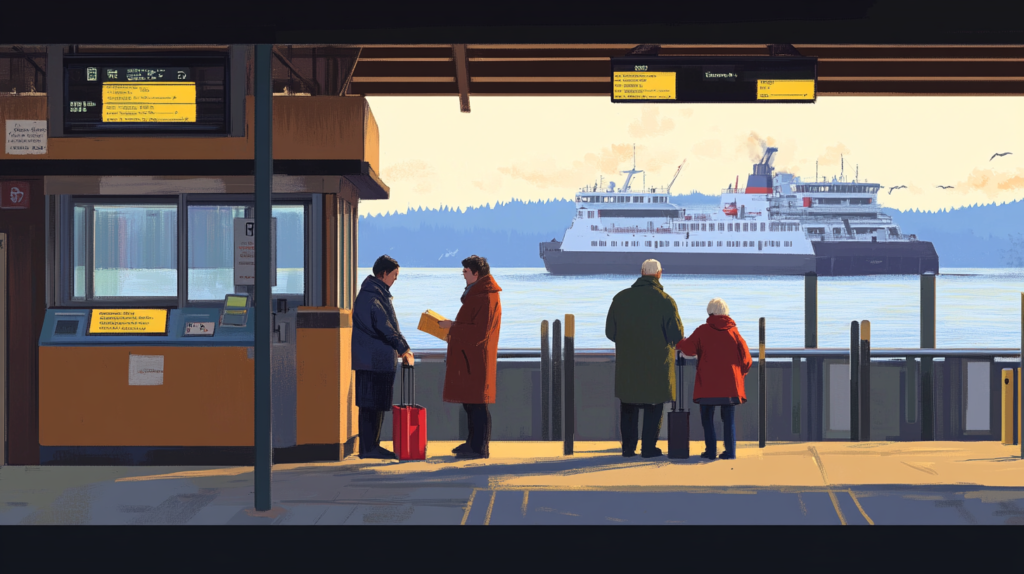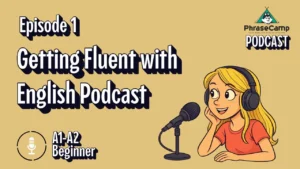Master TOEIC and ESL conversations for smooth public transportation in English. Perfect for intermediate English learners aiming to improve TOEIC listening, reading, and buying tickets.

Table of Contents
- Introduction
- Dialogue 1: Booking a Taxi
- Dialogue 2: Buying a Train Ticket
- Dialogue 3: Buying Ferry Tickets
- Key Vocabulary for Public Transportation
- Tips for Mastering TOEIC and ESL Transportation Conversations
- Conclusion
Introduction
When taking public transportation, mastering key English phrases can significantly improve your travel experience. Whether you’re preparing for the TOEIC exam or improving your ESL skills, learning how to communicate effectively in real-life situations like booking a taxi, buying train tickets, or taking a ferry is essential.
In this article, we’ll explore three essential TOEIC and ESL conversations designed to help intermediate English learners navigate public transportation with ease. You’ll learn practical phrases, useful expressions, and gain confidence when using English in real-world scenarios.
If you want to see our YouTube Video, click below and subscribe to our official YouTube channel!
Dialogue 1: Booking a Taxi
Setting: Over the phone, booking a taxi for airport transportation.
- Janice: Hello, Turtle Taxi Services. Janice speaking, how can I help you?
- Jimmy: Hi, I’d like to book a taxi for tomorrow morning at 6 AM. Do you have any taxis available then?
- Janice: Yes, we do. May I have your address and destination?
- Jimmy: 123 Oxford Street, London. My destination will be Heathrow International Airport.
- Janice: Thank you. How many passengers will that be?
- Jimmy: Just one.
- Janice: Could I have your name and contact number?
- Jimmy: Jimmy Brown, and my contact number is 555-1111.
- Janice: Okay, Mr. Brown, just to confirm: you’ve booked a taxi to pick you up at 123 Oxford Street, London, at 6 AM tomorrow morning, and your destination is Heathrow International Airport. Is that correct?
- Jimmy: Yes, that’s right.
- Janice: Thank you. Is there anything else I can help you with?
- Jimmy: Yes, I have a question about my bags. I have three large pieces of luggage—will they all fit in the boot of the taxi?
- Janice: Oh yes, that shouldn’t be a problem at all.
- Jimmy: Excellent, thank you for your help.
- Janice: You’re welcome! Have a nice day.
- Jimmy: You too.
Key Vocabulary:
- Available: Ready for use or service.
- Destination: The place where someone is going.
- Confirm: To ensure or verify information.
- Luggage: Bags or suitcases carried when traveling.
Key Phrases
- “How can I help you?”
- A common, polite phrase used to start a service-based conversation. It’s inviting and signals that the person is ready to assist.
- “Do you have any taxis available?”
- This question uses “available” to ask about the availability of a service at a specific time. It’s a key phrase for making inquiries about schedules or resources.
- “Just to confirm…”
- This phrase is often used in formal or service-related conversations to ensure that all details are correct before moving forward. It’s a way to avoid misunderstandings.
- “Will they all fit in the boot?”
- “Fit” refers to whether something can be accommodated in a certain space, and “boot” is the British term for the trunk of a car. Knowing regional vocabulary like “boot” vs. “trunk” is important for ESL learners, depending on where they are using English.

Dialogue 2: Buying a Train Ticket
Setting: At the train station, purchasing an express train ticket.
- Ticket Seller: Hello.
- Customer: Hi, I’d like to buy a ticket to Boston, but I was wondering how much faster the express train is than the local train?
- Ticket Seller: The express train takes around 3 hours and 45 minutes, while the local train will take a little over 5 hours to reach Boston.
- Customer: That’s quite a big difference. I’d like to buy an express ticket to Boston. Can I do that here?
- Ticket Seller: Certainly. Will that be a one-way or a round trip?
- Customer: A round trip.
- Ticket Seller: When would you like to depart?
- Customer: The next available. When would that be?
- Ticket Seller: The next express train was scheduled to depart at 1 PM; however, due to some maintenance issues, it’s delayed by 20 minutes, so it should depart at 1:20.
- Customer: I see…
- Ticket Seller: And would you like to take coach or business class?
- Customer: What’s the price difference between the two?
- Ticket Seller: Only $60. A round-trip business class express ticket costs $200, while coach is $140.
- Customer: Since it’s only a $60 difference, I’ll take business class.
- Ticket Seller: Great. That’ll be $200 then.
- Customer: Here are two hundred-dollar bills.
- Ticket Seller: Thank you! Here are your train tickets. Your train to Boston will depart from platform #5. We apologize for the inconvenience.
- Customer: Oh well, these things happen. Thanks for your help.
Key Vocabulary:
- Express Train: A train that makes fewer stops and travels faster than a regular train.
- Round Trip: A journey to a place and back again.
- Coach: The standard class in a train, cheaper than business class.
Key Phrases:
- “How much faster is the express train than the local train?”
- This question is comparing two services. ESL learners should note the use of “how much” to ask about a degree of difference (in time, speed, etc.).
- “That’s quite a big difference.”
- This phrase expresses surprise or realization that there is a significant variation between two options. “Quite” emphasizes the extent of the difference.
- “The next available…”
- A useful phrase for asking about the soonest possible option for a service, whether it’s for transportation, appointments, or reservations.
- “Due to some maintenance issues…”
- “Due to” is a formal phrase used to explain reasons or causes. It’s commonly used in service contexts to explain delays or problems.

Dialogue 3: Buying Ferry Tickets
Setting: At the ferry terminal, buying tickets for a family trip.
- Customer: Hi, I’d like to buy four ferry tickets to Staten Island.
- Staff: Would that be for four adults?
- Customer: No, it’ll be for two adults, one senior, and one child.
- Staff: Okay. Would you like a reserved or non-reserved ticket?
- Customer: I don’t know. What’s the difference?
- Staff: A reserved ticket guarantees you a seat, and you won’t have to wait in line as long to board. A non-reserved ticket doesn’t guarantee a seat, and you’ll need to wait longer.
- Customer: I see. How much is each ticket?
- Staff: A reserved adult ticket costs $18, while a non-reserved one is $14. Seniors over 65 pay $14 for reserved and $10 for non-reserved. How old is your child?
- Customer: He’s four.
- Staff: Children under four are free!
- Customer: Wonderful!
- Staff: So, would you like to purchase reserved or non-reserved?
- Customer: Reserved, no question.
- Staff: Great, that’s two adult and one senior reserved tickets. Is that correct?
- Customer: Yes, that’s right.
- Staff: For which departure time?
- Customer: The 3:10 ferry, if available.
- Staff: Certainly! Your total is $50. You can pay by credit card.
- Customer: Thanks. One last question: are these round-trip tickets?
- Staff: Yes, all ferry tickets are round-trip.
- Customer: Fantastic! Thanks for your help.
- Staff: Anytime! Enjoy the ferry ride.
Key Vocabulary:
- Reserved Ticket: A ticket that guarantees a seat.
- Non-Reserved Ticket: A ticket that does not guarantee a seat.
- Senior: Someone over 65 years of age.
Key Phrases:
- “Would you like a reserved or non-reserved ticket?”
- This question gives options between two services: “reserved” guarantees a seat, while “non-reserved” does not. It’s important for ESL learners to understand these distinctions when purchasing tickets.
- “How much is each ticket?”
- A straightforward and essential phrase for asking about prices. Knowing how to ask about cost is key in any service interaction.
- “Children under four are free!”
- “Under” is used to indicate age limits, in this case, meaning children younger than four don’t need to pay. This is useful when talking about age-related policies or discounts.
- “Are these round-trip tickets?”
- “Round-trip” refers to a ticket that covers both the journey to the destination and back. This is a critical term for public transportation.

Key Vocabulary for Public Transportation
In each of these conversations, you encountered key vocabulary that will help you communicate more effectively when using public transportation.
Words like ‘express train,’ ‘reserved ticket,’ ‘departure,’ and ’round-trip’ are common in travel situations.
Make sure to practice these words to improve your understanding and speaking skills.
Tips for Mastering TOEIC and ESL Transportation Conversations
- Practice Role-Playing: Try practicing these dialogues with a friend or language partner. This will help you become more comfortable using the phrases in real life.
- Learn Key Vocabulary: Focus on learning words and phrases related to public transportation, such as “platform,” “ticket,” and “luggage.”
- Listen to Native Speakers: Listen to native English speakers in real-world situations, either through videos or podcasts. Pay attention to the rhythm and intonation they use in conversations.
- Use Visual Aids: Watch videos of people buying tickets, boarding trains, or riding in taxis. This can help reinforce your listening comprehension.
- Take the TOEIC Practice Tests: TOEIC practice tests often include dialogues similar to the ones we’ve covered. Try taking some practice tests to see how much you’ve improved.
Conclusion
These three essential dialogues will equip you with the necessary tools to handle common public transportation situations in English. Whether you’re booking a taxi, buying a train ticket, or purchasing ferry tickets, the practical phrases and vocabulary in these conversations will help you communicate confidently. Keep practicing and expanding your knowledge, and soon you’ll find it much easier to navigate any public transportation scenario in English.
Remember, practice makes perfect, and each conversation is a step toward fluency.
Recommended Article
Here is a recommended article we think you would like:
“Advanced English Conversation: 7 Key Phrases from a Nightmare Trip to Tokyo“.


